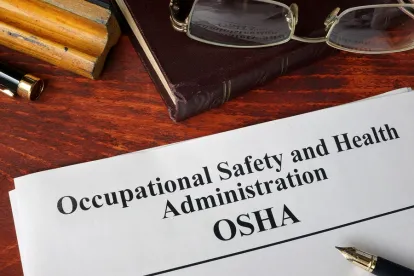Today OSHA published the final rule revising the Improve Tracking of Workplace Injuries and Illnesses regulation promulgated under the Obama administration. The final rule aligns with the proposed rule and rescinds the requirements for establishments with 250 or more employees to electronically file information from OSHA Forms 300 and 301. As is currently the requirement, these establishments will continue to submit information from their Form 300A. The final rule now requires all covered employers to electronically file submit through OSHA’s Injury Tracking Application (ITA) only the 300A Form.
In the final rule, OSHA emphasized,
Elimination of the requirement that establishments with 250 or more employees submit information electronically from their OSHA Forms 300 and 301 – a requirement that has not yet been enforced – does not change any employer’s obligation to complete and retain injury and illness records under OSHA’s regulations for recording and reporting occupational injuries and illnesses. The final rule also does not add to or change the recording criteria or definitions for these records.
The agency received 1,880 comments to the proposed rule and some commenters expressed concerns over the possible publication of the electronic information submitted to OSHA. In response, OSHA stated that “…the agency takes the position that these data are exempt from public disclosure under FOIA.” Other commenters raised concerns over the application of the regulation to employer drug testing and incentive programs. OSHA made clear that the regulation does not ban drug testing or prohibit incident-based incentive programs. OSHA stated that Section 1904.35(b)(1)(iv) of the regulation
…merely prohibits employers from implementing these programs to penalize workers “for reporting a work-related injury or illness.” Id. (emphasis
added). On October 11, 2018, OSHA issued a memorandum that explained this regulatory text and OSHA’s position on workplace incentive programs and post-incident drug testing. See U.S. Dep’t of Labor, Clarification of OSHA’s Position on Workplace Safety Incentive Programs and Post-Incident Drug Testing Under 29 CFR § 1904.35(b)(1)(iv) (Oct. 11, 2018).
Additionally, under the final rule OSHA is amending the regulation to require covered employers to submit their Employer Identification Number (EIN) electronically along as part of their submission to the agency. According to OSHA, “many commenters agreed with OSHA that collection of the EIN would enhance the utility of the data and therefore improve worker safety and health. Several commenters provided specific examples of how the EIN can be used by OSHA for research purposes, such as identifying employers with patterns of injuries…and matching against other databases that contain the EIN to add characteristics to the data…..”
The regulation now requires that for each establishment that is subject to the electronically filing requirements, the employer must provide the EIN used by the establishment. It is unclear whether OSHA will require this information for the upcoming March 2nd deadline. Given that the final rule is effective on February 23, 2019, arguably employers who submit their 300A forms on or after this date, but before March 2, 2019, would be required to provide their Employer Identification Number for the establishment.
While these revisions are generally supported by employers, not all interested parties support the revisions to the Obama era regulation. Some labor groups have raised the concern that since the review and approval of this final rule by the Office of Information and Regulatory Affairs (OIRA) occurred on January 18, 2019 it was conducted during the government shutdown when OIRA lacked funding. And, since OIRA is funded from the Treasury and General Government Appropriations, which has not been appropriated by Congress, it violated the Antideficiency Act, which prohibits the government from spending if funds have not been appropriated by Congress. It is unclear whether any party will take legal action, but it seems to be something considered by those who oppose the revisions to the regulation.




 />i
/>i

